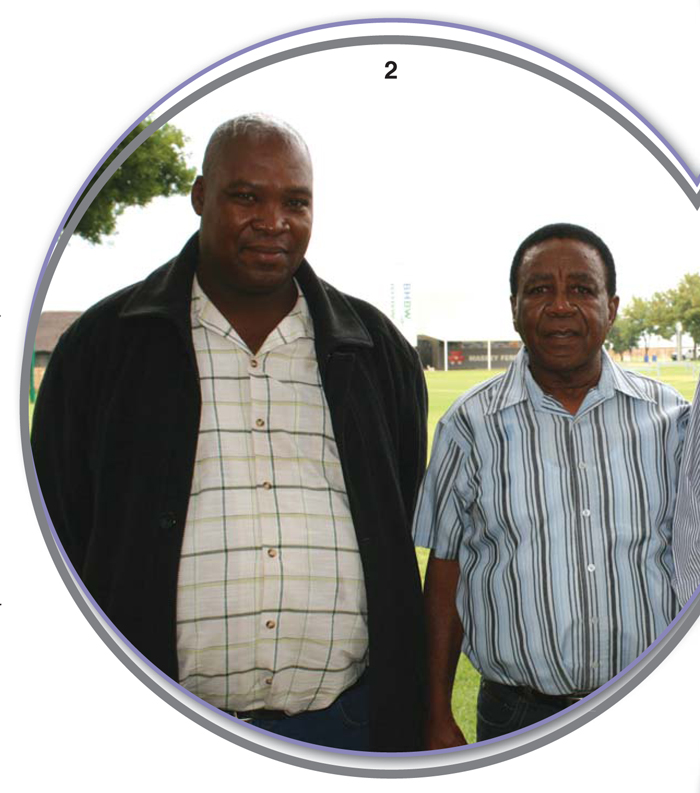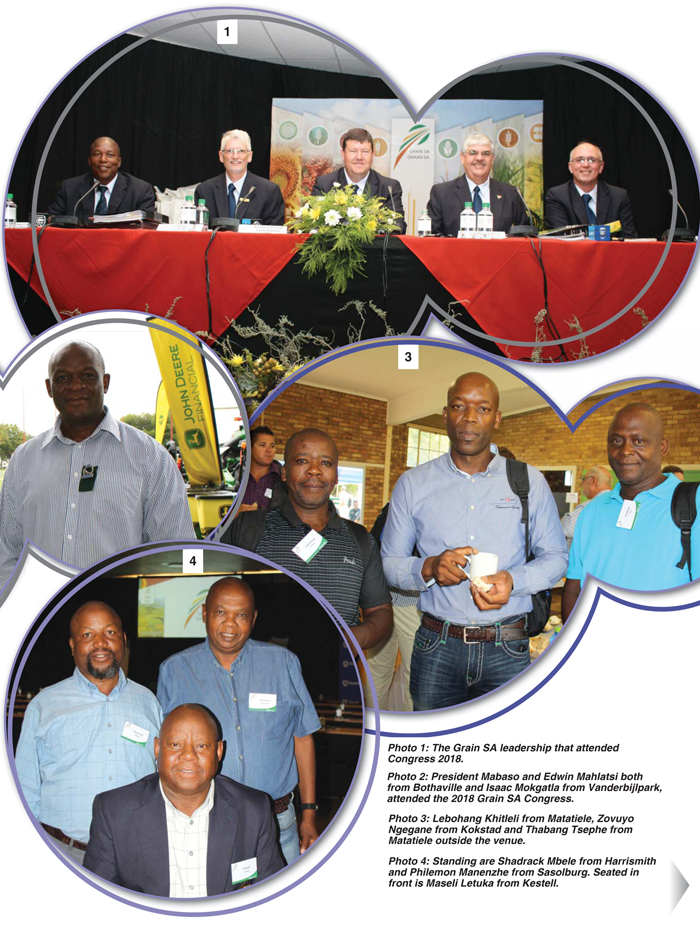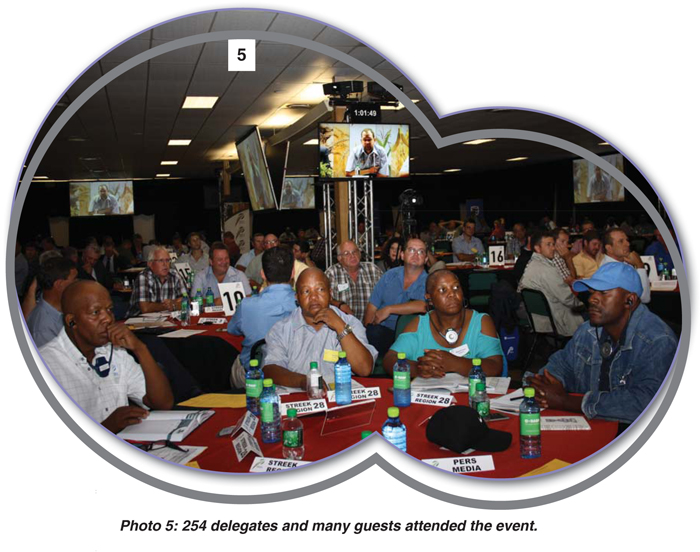A gathering of grain farmers at 2018 Congress
May 2018
 The annual Grain SA Congress of delegates gathered at NAMPO Park in March. The Fanie Ferreira venue was filled with the buzz of happy reunions.
The annual Grain SA Congress of delegates gathered at NAMPO Park in March. The Fanie Ferreira venue was filled with the buzz of happy reunions.
Chairperson, Jaco Minnaar delivered his Annual Report and the year’s activities were highlighted in a visual presentation. Minnaar said it had been a challenging year but also noted that there had been record harvests and this was reflected in the levy income to Grain SA which had reached record heights.
Minnaar called upon all farmers to carefully consider which crops to plant because production is increasing faster than demand. Farmers need to think carefully before planting maize because ‘the time has passed that we can plant ourselves out of trouble!’
Minnaar said Grain SA supports land reform unequivocally and reinforced Grain SA’s commitment to farmer development, saying the organisation supported over 10 000 farmers through its Farmer Development Programme. He highlighted that the biggest constraints for developing famers are:
- Access to finance for inputs; and
- Lack of ownership of title deeds – no title deed means no collateral to access finance. Minnaar said Grain SA holds the firm belief that this will be the necessary trigger for radical economic transformation. ‘Take away the security of title deeds and you take away the farmers’ ability to produce.’
The Chairperson then said that Grain SA says ‘NO’ to ‘Expropriation Without Compensation’ (EWC) and ‘a new society cannot be created by reproducing a repugnant past’.
Vice-chairperson Derek Mathews set the cat amongst the pigeons when he proposed that Congress accept a motion that:
- Grain SA recognises and supports the need for land reform and transformation in South Africa;
- Grain SA recognises the need for a thriving and prosperous grain sector to sustain and enhance food security to the benefit of all in South Africa;
- Grain SA will continue to advocate for and aspire to the handing over of title deeds to the beneficiaries of all land reform farms; and finally
- Grain SA continues to oppose the motion recently submitted in parliament to change the South African Constitution which would enable EWC.
The proposal was followed by a difficult discussion which saw emotions running high. Victor Mongoato, past Vice-chairperson of the organisation, said that the developing farmers could not support the motion in its entirety so they had to oppose the motion and stated that they support the standpoint of AFASA on EWC. Mr Maseli Letuka from Kestel added that developing farmers did not wish to participate in a vote on the matter.
It is true that the spectrum of opinions and emotions was wide but as Guy Butler wrote in his poem ‘A Prayer for all my Countrymen’ – here and there a heart stayed warm, a head grew clear. What made a lasting impression on me were the voices calling for careful consideration of a sensitive matter.

Mathews explained his conviction that land reform is possible within the existing constitution so no changes were necessary if government implemented within current law and said he feared that tampering with the Constitution creates a dangerous precedent. Others, both black and white, spoke of the long way farmers have come as neighbours and friends, of the goodwill that exists between them and called for calm.
 Protagonists on both sides insisted that farmers should find a path which will build unity rather than create division within the organisation. Day Two saw a new motion put to Congress by 2017 Vice-chairperson Mr Ramodisa Monaisa, who expressed thanks to everyone for their positive inputs on a sensitive issue saying: ‘It has made us great’:
Protagonists on both sides insisted that farmers should find a path which will build unity rather than create division within the organisation. Day Two saw a new motion put to Congress by 2017 Vice-chairperson Mr Ramodisa Monaisa, who expressed thanks to everyone for their positive inputs on a sensitive issue saying: ‘It has made us great’:
- Grain SA recognises the need for, and supports land reform and transformation in South Africa.
- Grain SA also recognises the need for a thriving and prosperous grain sector to sustain and enhance food security.
- Grain SA must and will continue to advocate for and aspire to the handover of title deeds to the beneficiaries of Land Reform.
- Grain SA will as a matter of urgency, seek out and engage with the ruling party and make every effort to reach consensus on all aspects of this matter.
- Until such time as consensus is reached the current Constitution is upheld.
Mongoato seconded the new motion with appreciation saying: ‘We are in this together’. Minnaar expressed his thanks for the valuable conversations that led to a unanimous acceptance of the motion.
Delegates were stimulated by interesting guest speakers
- Prof Fred Below from the University of Illinois spoke on ‘The seven wonders of grain production’– weather, nitrogen, hybrid, previous crop, plant population, tillage and growth regulators. He said increased yields require higher plant populations, the right hybrid and better crop nutrition.
- Ronald Jetten of COFCO spoke about the international export opportunities which we need because South African maize production is higher than consumption which puts a downward pressure on prices. If we want to keep growing maize we have to find markets so our prices improve.
- Prof Guy Midgely talked about ‘Climate resilience’. He said whether we believe it or not climate change is a reality and we must empower ourselves by finding new ways to farm better in a changed climate. He encouraged farmers saying there is still time to prepare and we must look at soil management, pest management, and cultivar selection. He advised farmers to learn to use climate prediction information.
- Brand Pretorius retired CEO of McCarthy Motors spoke about ‘Leadership’. We are all leaders on our farms and in community. Leadership is not a right; it is a responsibility. We earn the right to lead. To lead is also to serve. ‘Before you ask a hand, you need to touch a heart.’ ‘Leadership is about care: You can be bold, but not a bully; you can be gentle, but fearless; you can be rigorous about results, not ruthless about people; you can be gentle, but fearless and kind, without being weak.’ He said that leaders are torch bearers of hope and reminded us that Nelson Mandela said, ‘Hope is life itself’. Hope is a doing word and leaders must stand for the truth and do the right things right!
- Prof Mohammad Karaan is an agricultural economist. Talking about land reform he said: ‘This time we’ve got to get this right!’ The three most important priorities for South Africa are:
- Growth and economic transformation;
- To enhance educational outcomes (focus on children); and
- To improve the capability of the state. In the next five years agriculture has to pay attention to:
- Land reform – along the lines proposed by the National Development Plan including soft forms of expropriation;
- Water reform – we have to do more with less;
- Education and incubation – creating an environment where people can acquire knowledge and then be apprenticed in farming;
- Integrate State and markets – we have to do this; and
- Revitalise agriculture in former homeland areas. Prof Karaan said he is encouraged by the work Grain SA Farmer Development has been doing.
Article submitted by Jenny Mathews, Pula Imvula contributor. For more information, send an email to jenjonmat@gmail.com.
Publication: May 2018
Section: Pula/Imvula
 The annual Grain SA Congress of delegates gathered at NAMPO Park in March. The Fanie Ferreira venue was filled with the buzz of happy reunions.
The annual Grain SA Congress of delegates gathered at NAMPO Park in March. The Fanie Ferreira venue was filled with the buzz of happy reunions.
 Protagonists on both sides insisted that farmers should find a path which will build unity rather than create division within the organisation. Day Two saw a new motion put to Congress by 2017 Vice-chairperson Mr Ramodisa Monaisa, who expressed thanks to everyone for their positive inputs on a sensitive issue saying: ‘It has made us great’:
Protagonists on both sides insisted that farmers should find a path which will build unity rather than create division within the organisation. Day Two saw a new motion put to Congress by 2017 Vice-chairperson Mr Ramodisa Monaisa, who expressed thanks to everyone for their positive inputs on a sensitive issue saying: ‘It has made us great’: